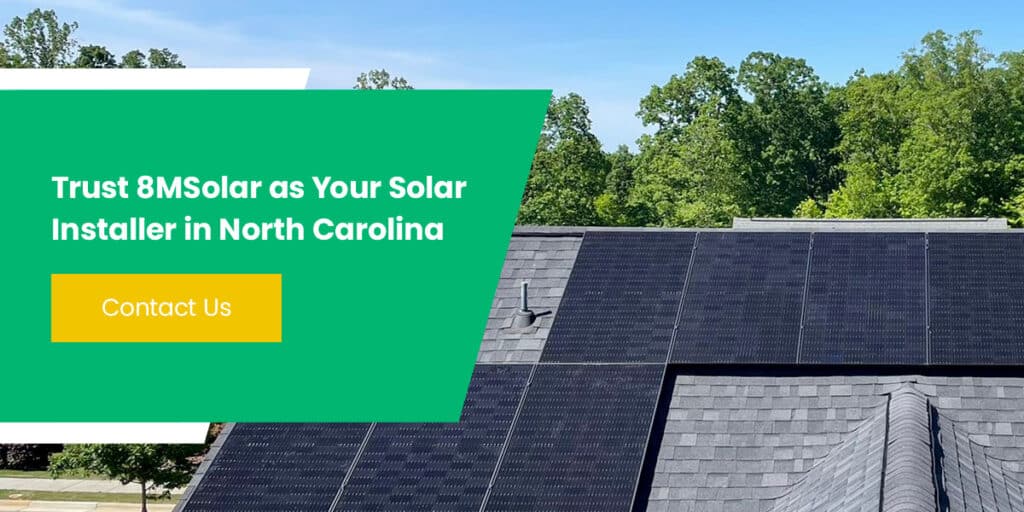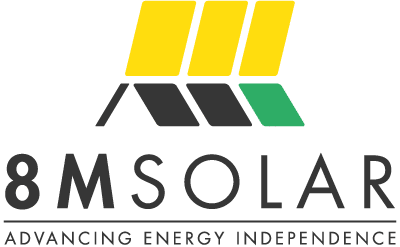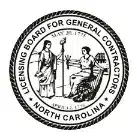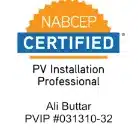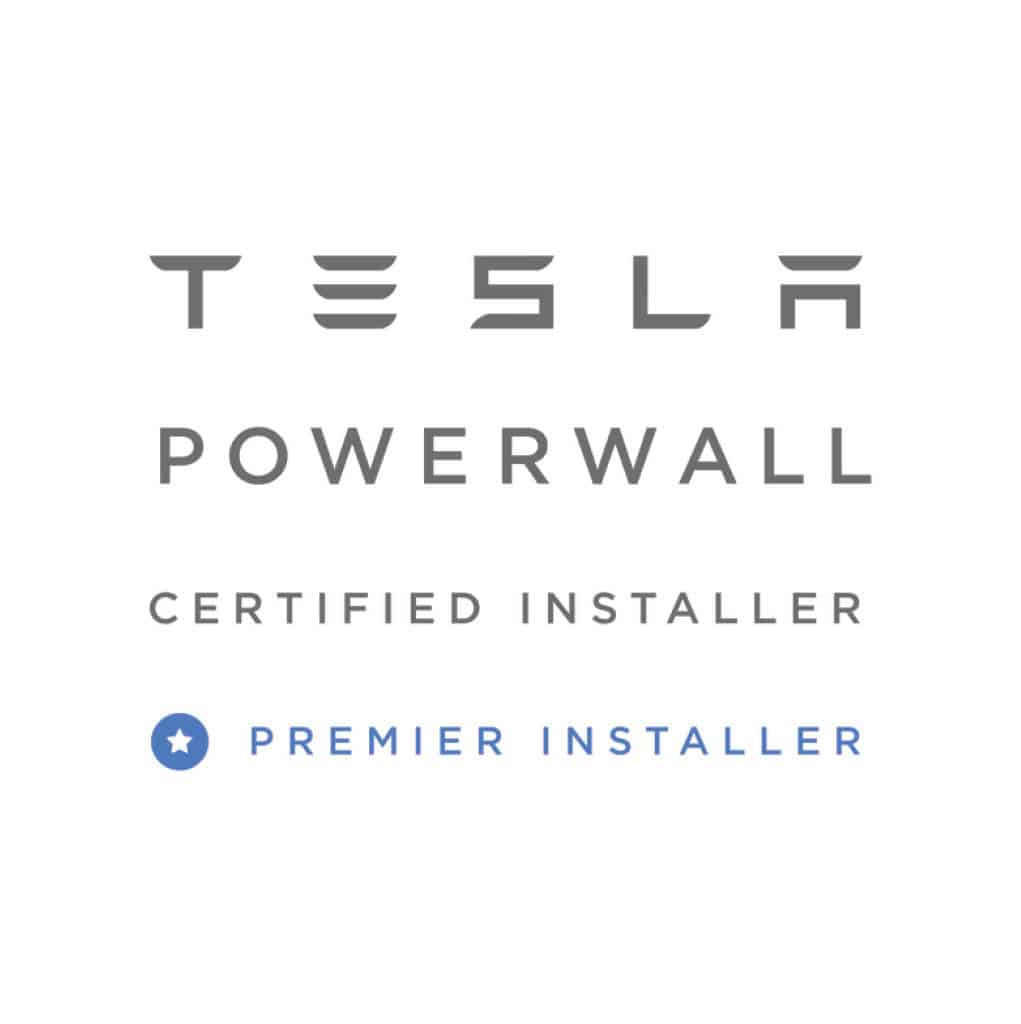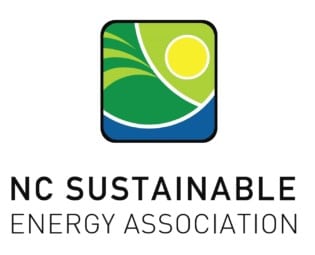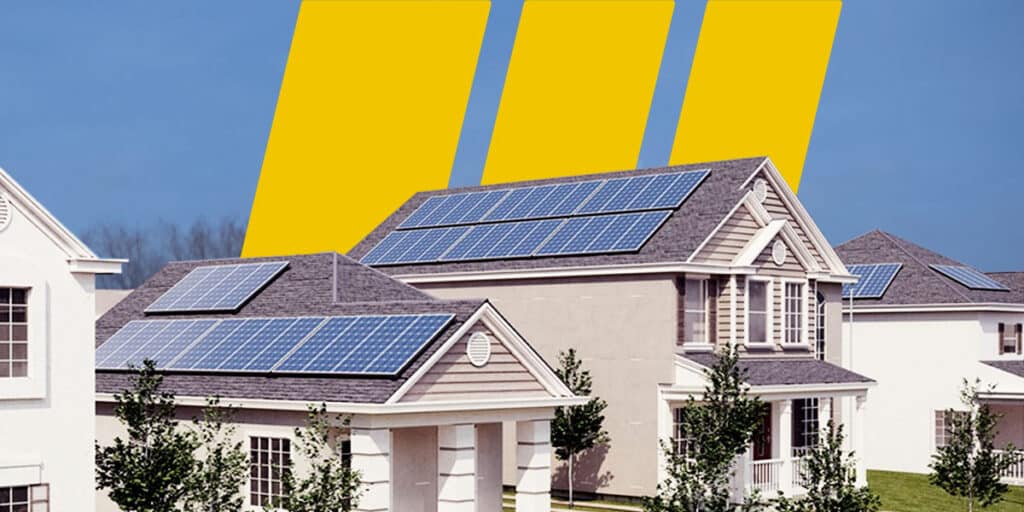
By installing solar panels, you can become independent from the electrical grid, allowing you to produce renewable electricity from the sun. Further, investing in solar panels can help you save on your monthly utility bills and reduce your greenhouse emissions, which helps you be more eco-friendly.
If you are a homeowner or business owner in North Carolina, you have come to the right place to learn all about solar panels and how 8MSolar can help you meet your solar goals. Our solar panel consumer guide has everything you need to get started with your solar energy system.
Types of Solar Panels
Understanding the different types of solar panels can help you make an informed decision when it comes time to equip your home or business with your own panels. Learn about residential solar panels and their costs to improve your hunt for the right solar panel. There are three main types of solar panels, which include:
- Monocrystalline solar panels: Of all the types, monocrystalline solar panels are the most common. These square-like panels are made from pure silicon, which is turned into cells and organized into a solar panel. Due to the pure silicon, the panels appear black, and you can choose from various colors for the back sheets and frames. Overall, monocrystalline panels boast high efficiency and performance.
- Polycrystalline solar panels: These types of panels are growing in popularity thanks to their efficiency. Similar to monocrystalline panels, polycrystalline panels use silicon. However, the process of making the panels creates solar wafers that are organized into a panel. These solar cells appear blue as the sunlight reflects on them, and their frames tend to be silver.
- Thin-film solar panels: These panels are some of the newer models available on the market. Offering high versatility, thin-film solar panels can be made from a range of materials as opposed to silicon, including cadmium and copper. These panels are significantly thinner than other types and can vary in color, though they are usually black or blue.
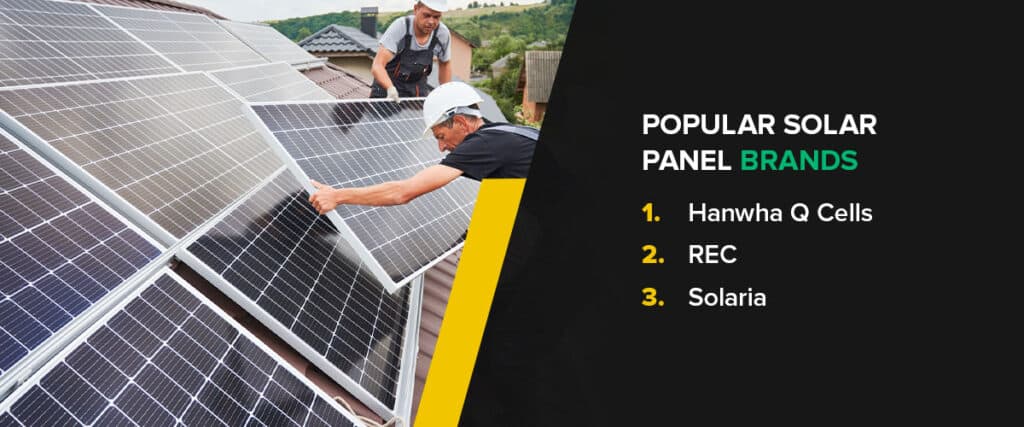
Popular Solar Panel Brands
Deciding on a solar panel brand for your North Carolina property can take time and research. To help make the process easier, here are three brands we recommend for their strength and quality:
1. Qcells
Qcells is one of the most notable solar panel brands worldwide, with the Q.Peak DUO BLK G10+ being one of the most popular options. These panels can generate up to 400 watts per panel, supplying your home or business with plenty of power. Qcells panels come with 25-year warranties, ensuring an 86% power output in the first 25 years.
Qcells offers great quality for an excellent price. The brand’s panels boast a high weather rating, high efficiency and high performance. If you choose Qcells panels, you can rely on them as a reliable investment that provides renewable energy to your home or business for years to come.
2. REC
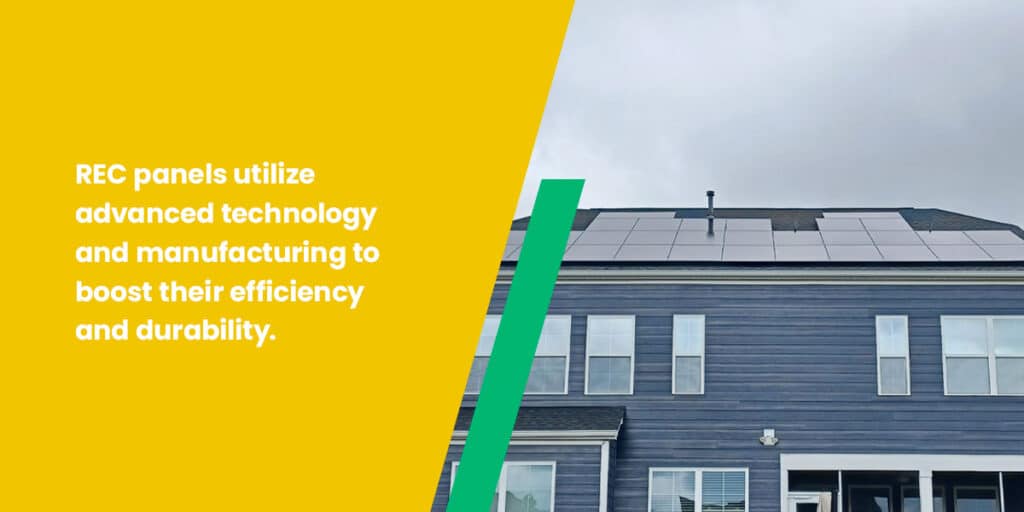
Another solar panel brand to note is REC. The REC Alpha Pure panels can produce up to 405 watts per panel with a 25-year power output warranty guaranteeing a 92% power output.
Another future product that we are excited about is the REC Alpha Pure R panel which is expected to be available in Q2 2023. This panel is expected to be a staggering 22.3% efficient while maintaining the same high-quality build and REC warranties.
REC panels utilize advanced technology and manufacturing to boost their efficiency and durability. Due to their design, REC panels can perform even when shaded. This design also increases the active area of the solar panels, allowing them to capture more sunlight and increase energy production.
Investing in REC panels can help you achieve partial or complete energy independence for years.
3. Solaria
One of the best solar panels for homes is Solaria, manufactured by a California company specializing in high-quality residential panels. Two of the brand’s primary residential solar panel options boast high efficiency and performance:
- Solaria PowerX: The Solaria PowerX can achieve 400 watts and offers a 25-year warranty with an 86% power guarantee. These panels provide excellent value for their quality, allowing homeowners to invest in their own solar systems. The sleek design is appealing to homeowners looking for a minimal look and their low-light performance and high-efficiency rating enable them to perform from dawn until dusk.
- Solaria PowerXT: These solar panels are the most premium option on the market right now, reaching 430 watts per panel. Solaria offers an industry-best 30-year power output warranty and a 30-year warranty on parts and labor. These panels can be installed with limited roof space due to their small size and high wattage per panel. This is the only panel that is truly an all-black solar panel.
Most Common Panels Installed by 8MSolar
At 8MSolar, we are constantly surveying all available panel options to help you determine the best fit for your home or business. Our most popular panels are the Q.Peak DUO BLK G10+, REC Alpha Pure, Solaria PowerX and the Solaria PowerXT. These are our most popular due to their quality, strength and ease of warranty process. 8MSolar is also a REC ProTrust Installer, and with our extensive expertise, we can help you decide which brands best fit your home or business.
That being said, 8MSolar is hardware agnostic, and we can install any solar hardware available in the United States. Other popular brands include SunPower, Mission Solar, TRINA, Longi Solar and more!
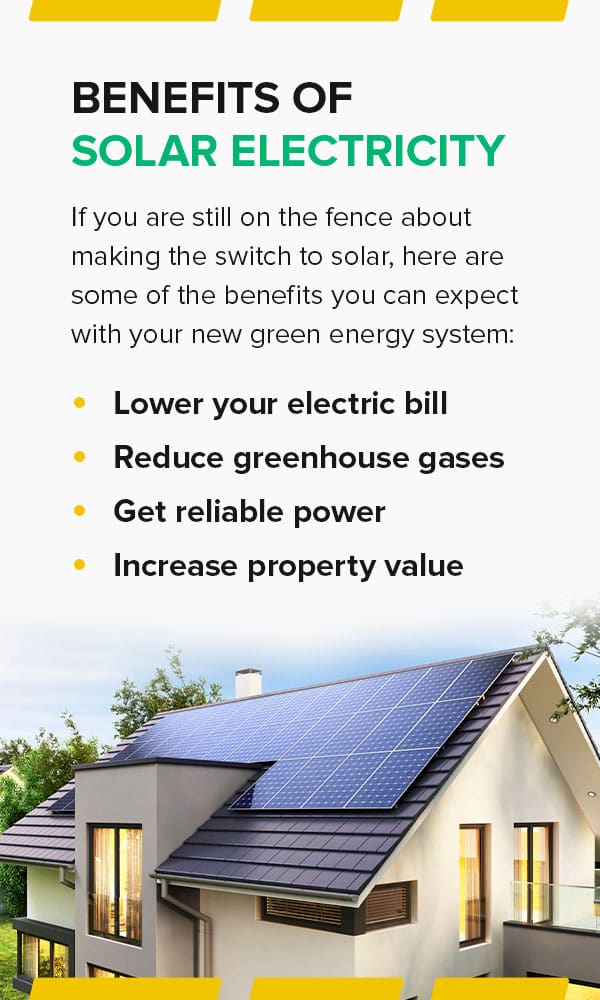
Benefits of Solar Electricity
Buying residential solar panels or commercial options comes with lots of excellent benefits. You will be doing your part to help the environment without sacrificing comfort. Solar is available everywhere, and with it becoming more affordable every year, there is little reason to put off going solar. If you are still on the fence about making the switch to solar, here are some of the benefits you can expect with your new green energy system:
- Lower your electric bill: While your sunlight amount, local rates and energy usage are unique to each home or business, you can expect to see a reduced energy bill when you pair your solar power with Energy Star-certified systems. Additionally, you can expect to save with federal and state solar tax credits.
- Reduce greenhouse gases: Investing in renewable energy helps reduce greenhouse gases and protects the environment. Solar energy use will decrease your CO2 emissions, lower pollutant release and reduce water consumption. You will do your part to help the environment without giving up a reliable power source.
- Get reliable power: Solar power works everywhere in the United States — even areas with less sun will save big on energy and get good power using solar. Solar power is highly efficient, so you can trust your solar panels to keep your home powered year-round.
- Increase property value: Installing solar panels can increase your property’s value, especially if they are high-quality. Prospective buyers love seeing cost-saving solar panels on a home or commercial building, making your property stand out from others.
Choosing a System
Before your installation begins, you will need to pick a solar system for your home or business. Your budget, property and location will affect your chosen solar system. Talk to your solar company about the different options and requirements — a quality solar installer will work with you to get the best system for your needs. Here are some of the factors that affect the system you will choose:

Roof Requirements
Your roof needs to be the right size, strength and condition to support your solar panels. Systems weigh several pounds per panel, and your roof needs to support their weight. Your roof’s size will also affect your solar system — smaller roofs might not be able to support a large enough system for your needs, so you might have to consider only using solar for a select portion of your energy usage. You will likely need a roof inspection — your roof needs to be in good condition to support your system continually.
Orientation
Solar panels can be installed on any roof, regardless of what direction your roof faces. However, you can get the most light and solar production by installing your solar panels on a south-, east- or west-facing roof. North-facing roofs tend to get less sunlight due to the way the sun rises and sets in most places. A south-facing roof with no shade is the best place for maximum solar production.
If your roof is covered in some shade or does not face south, you may need to install a few additional panels to maximize your solar coverage. You can also choose to install solar panels in your yard if it makes the most sense for your property. Contact us for a consultation, and we will review all of your options given your specific property.
Shading
Trees, buildings, chimneys and more can all block solar panels from absorbing maximum sunlight. You might need more panels to compensate for shading. Additionally, your solar professional will help you determine how many panels you need for your energy usage and the best spots to put them after accounting for shading and location conditions.
Solar Panel Installation
After selecting your solar system, you will want to do more research into the installation. The solar panel installation process can be lengthy, but with the right help from your solar installer, it can be a breeze. Below is what you can expect to help you prepare for your new installation:
- Site evaluation: The first step of the installation process is having your solar installer visit your home or business to evaluate the location, helping you determine the best place for your solar panels. Your installer will likely check your electrical setup, roof, attic and battery placement, if applicable.
- Design: After the evaluation, it is time to move on to the design process. The design process is essential to ensure your solar panels fit your home properly. You can review the design, provide feedback or approve it to ensure it works for your home and energy needs.
- Permitting: Once you have approved the design, your solar installer will handle the permitting process, which includes sending all necessary documentation to the city for approval. Permitting fees are often included in the cost of the installation.
- Installation: Once your permits have been approved, installation can start, which usually takes just a few days. Your solar installer will handle the installation process, but keep in mind that you may need to have your power off for a few hours.
- Utility connection: The last step is to connect your solar panels to the grid, which is essential if you want to take advantage of net metering. Once this process is complete, you can start using your solar panels and make the most of your energy savings.
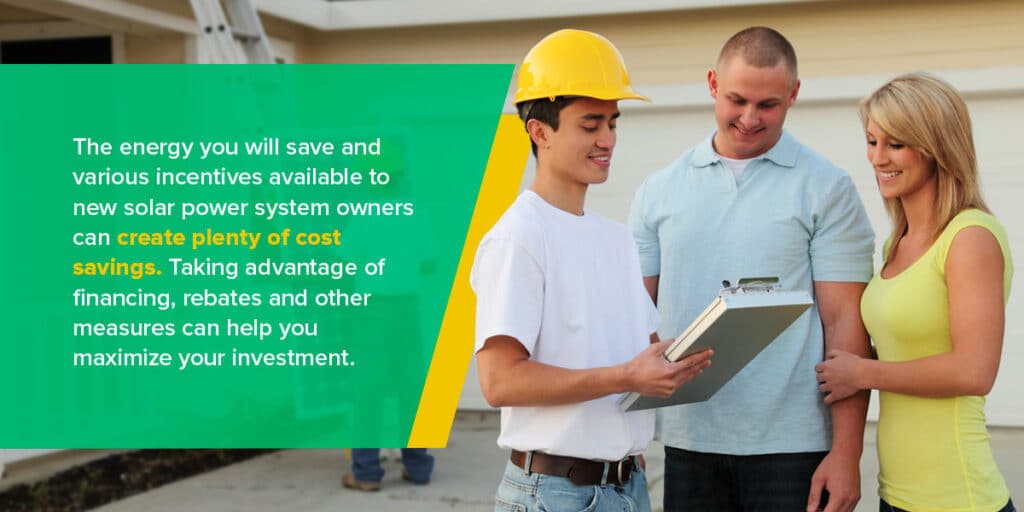
Solar Energy System Cost and Incentives
The energy you will save and various incentives available to new solar power system owners can create plenty of cost savings. Taking advantage of financing, rebates and other measures can help you maximize your investment.
Some of the costs and incentives to consider include the following:
- Cost: The average solar panel cost varies based on various factors, such as your property’s setup. Talking with our solar installer can help you get a better idea of home much a new solar system can cost, and they can also provide you with information regarding solar savings they may offer.
- Financing options: You might want solar but need help paying for the system. If you need help paying for the solar system, many installers have financing options to help you get solar panel installations, even if you cannot afford them outright. Additionally, there are loan and refinancing options.
- Net metering: Net energy metering is a process that allows you to sell your surplus energy back to a utility operator for credits. Any solar-generated power you do not use goes to the company, and you get credits toward your own energy bill, reducing your costs.
- Tax incentives: The federal government offers a 30% Solar Investment Tax Credit, which helps reduce how much you owe to the government for your new solar panel system.
- Additional incentives: Some states, cities and counties may offer additional incentives to solar installers, so it is essential to research the incentives in your area and ask your solar installer about these possibilities so you can generate as much savings as possible.
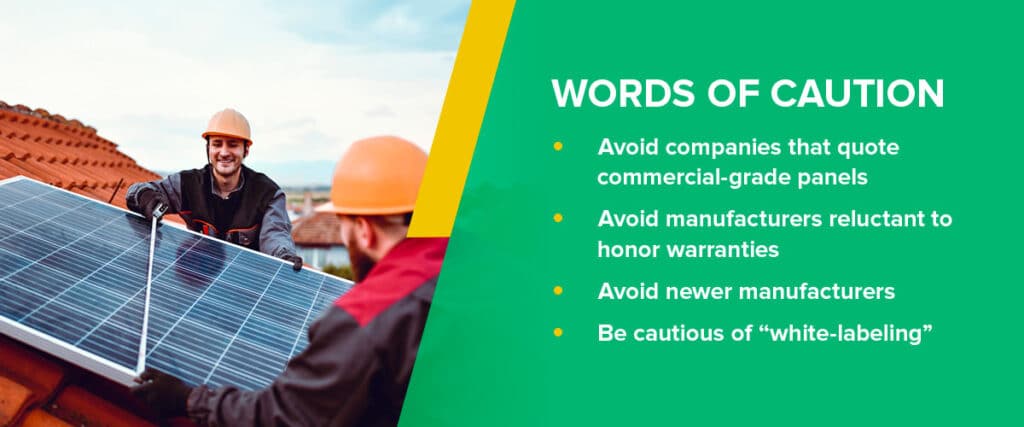
Words of Caution
Before choosing a solar brand, you should consider a few points to ensure you make the best investment possible. Avoid the following mistakes to ensure you choose solar panels that are high-quality, efficient and long-lasting:
- Avoid companies that quote commercial-grade panels: Because commercial panels are significantly larger, they usually produce less power per square foot than residential panels. These panels have shorter warranties and are not necessarily designed for shingle roofs. If you are a homeowner interested in solar panels, look for a company with dedicated residential solar panel installations to ensure you get the right fit for your home.
- Avoid manufacturers reluctant to honor warranties: Solar panels are an investment, and you want to ensure your warranty will be honored if something occurs.
- Avoid newer manufacturers: Brand-new solar manufacturers may not have been established long enough to honor a 25-year warranty, which is why we choose to work with established manufacturers with warranties you can trust.
- Be cautious of “white-labeling”: Some brands work with third parties to manufacture their panels and label them with their names without being involved in the manufacturing process. These companies are unlikely to ensure the quality of the panels from start to finish, so it is best to use a solar installer that works directly with a manufacturer to guarantee you are getting the best investment.
Trust 8MSolar as Your Solar Installer in North Carolina
8MSolar can help you find the best solar brand for your home or business. We will guide you through every step of the process, from design to installation. We also offer repair services for our residential customers to ensure their investment lasts. Contact us today to learn more about our solar services and how we can help you make the most of your new investment!
